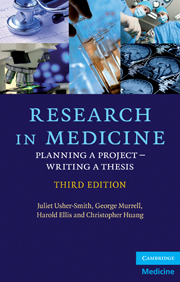Book contents
- Frontmatter
- Contents
- Preface
- 1 Introduction
- 2 Deciding whether to do research
- 3 Deciding when to do research
- 4 Selecting a research degree
- 5 Choosing a department, research supervisor and project
- 6 Applying for research positions and funding
- 7 Getting started
- 8 Overcoming frustration
- 9 Writing scientifically
- 10 Publishing a paper
- 11 Attending scientific meetings
- 12 Writing a thesis
- 13 Submitting a thesis and preparing for the viva voce examination
- Further reading
- Appendix: Information for research students wishing to study overseas
- Index
4 - Selecting a research degree
Published online by Cambridge University Press: 05 May 2010
- Frontmatter
- Contents
- Preface
- 1 Introduction
- 2 Deciding whether to do research
- 3 Deciding when to do research
- 4 Selecting a research degree
- 5 Choosing a department, research supervisor and project
- 6 Applying for research positions and funding
- 7 Getting started
- 8 Overcoming frustration
- 9 Writing scientifically
- 10 Publishing a paper
- 11 Attending scientific meetings
- 12 Writing a thesis
- 13 Submitting a thesis and preparing for the viva voce examination
- Further reading
- Appendix: Information for research students wishing to study overseas
- Index
Summary
Most medics doing a period of research will wish to work for a higher university degree. Besides the intrinsic interest they will have in pursuing such research, they will be balancing the time they will be putting aside for this against the benefits such an exercise would confer for their future careers.
What degrees are available?
Some UK and Commonwealth universities encourage their medical (undergraduate) students to enter for intercalated Bachelor of Medical Science (BMedSc) or Bachelor of Science (BSc) degrees. Others offer postgraduate Master of Philosophy (MPhil) or Master of Science (MSc) degrees. At the postgraduate level, most universities offer a Doctorate of Philosophy (PhD or DPhil). Some US and UK universities have combined MD-PhD and MB-PhD programmes. Most universities in the UK and Commonwealth also offer MD (Doctor or Medicine) and MS (Master of Surgery) degrees for medical and surgical candidates, respectively. In London, the MD and MS have now been replaced by the MD(Res) (Doctor of Medicine (Research)) degree. Other universities have abandoned the MS and, at these universities, the surgical candidates submit an MD thesis alongside their medical colleagues, and are subject to the same regulations. The standard (and often the regulations) for the degree of MS and MD are considered to be equivalent to each other. Note that in the US, the MD (Doctorate of Medicine) is the basic medical degree, not a higher research-based medical degree.
The intercalated BSc
In the UK, Oxford and Cambridge students have compulsory third-year courses, usually including a research module, which lead to an Honours BA.
- Type
- Chapter
- Information
- Research in MedicinePlanning a Project – Writing a Thesis, pp. 17 - 24Publisher: Cambridge University PressPrint publication year: 2010

